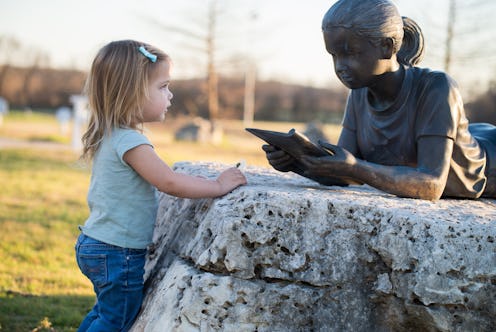Books
7 Facts About Kids Who Learned To Read Early

I’m pretty sure I learned to read before I was born — OK, so maybe not quite that early, but I do know for a fact that I was being read to before I was born, and immediately after I was born, and just about every single day of my young life until I learned to read all by myself at the ripe old age of 4. (Sure, I hadn’t quite mastered Pride and Prejudice yet, but The Rainbow Fish is an awfully impressive literary achievement when you’re three-and-a-half feet tall.) And looking back, I think all that reading definitely played an essential part in shaping the word-obsessed, always-reading, book-loving fool that I grew up to be. (And thank goodness, since my whole life pretty much revolves around books today.)
Research in early childhood development has long demonstrated the benefits of learning to read early in life. Sure, there are those who disagree with the benefits of reading young (there always has to be one) but the overall general consensus is that learning to read is good (duh) and learning to read at a young age is even better. Here are seven facts about kids who learned to learned to read early, aka: seven reasons why your next Auntie-outing is totally going to include a trip to the local library.
1. Reading Improves Brain Development
This fact might seem totally self-explanatory, but research has shown that between birth and the age of 6 is when children are able to learn at the fastest rate they ever will in their lives. The active brain cells a child is born with are constantly forming connections, which are strengthened by activities like reading — so reading to a little one, and later teaching them to read, can influence healthy brain function that will last a lifetime.
2. A Love Of Reading = A Love Of Learning
Not once growing up did my mother ever have to force me to wake up and go to school — there were books there, after all! Research has shown that the attitudes we develop about reading and learning as children will carry over into our school-aged and adult lives. Ergo, learning to love reading as a child means learning to love learning as a child. Which means school feels like a far less scary place than all those ‘90s afternoon sitcoms made it out to be.
3. Reading Has A Positive Effect On Parent-Child Bonding
As a young’un who spent many an afternoon snuggled in my mother’s lap, being read to, or practicing my own reading skills, I am living proof that the book bonds formed between parent and child in childhood last a lifetime. (My mother and I go to the bookstore together on a regular basis, and are always taking about what we’re reading.) But I’m not the only one: Research shows there are tons of benefits to parent-child bonding over books, from establishing a safe and nurturing space in the home, to sharing new learning experiences together, and lots more.
4. Reading Leads To Improved Communication Skills
Young readers more adept at developing correct language and grammar skills, forming a larger personal vocabulary than their non-reading peers, and understanding the use of context clues to infer the meaning of an unfamiliar word. Plus research has also shown that young readers are simply better at communicating in general. Reading teaches children to ask questions, wait for answers, and explore events and information from a variety of perspectives. Can you say #ReadingBenefits?
5. Reading Promotes Self-Confidence And Creativity
Not only has research shown that learning to read improves self-confidence — by presenting children with a challenge, and teaching them the skills necessary to overcome it — it also offers children the confidence and imaginative space needed to develop their own creativity. And arts-based creativity isn’t the only kind of creative thinking that reading promotes. Early reading has also been shown to positively impact creative problem solving skills in areas ranging from personal relationships to professional and business challenges later in life.
6. Early Reading Encourages A Child’s Independence
I know firsthand what an astounding new world is opened to a child once they learn to read — with those first few pages it can seem as though the entire universe has suddenly become accessible, just pages away. This is not an uncommon experience for young readers — reading encourages children to make choices for themselves (for example: do I want to read, and if so, what?) as well as allowing children to cultivate their own unique interests and curiosities, separate from their parents, siblings and peers. All between the covers of a book.
7. They’ll Literally Never Ask You If “You’re There Yet” On Long Trips
OK, so I might have made this one up myself, but based on the extensive scientific research I’ve conducted of my own life (by, you know, living it) this is all kinds of true. I took my fair share of minivan trips growing up, and both my family and I can attest to the fact that not once did I whine about the amount of time spent in the car. In fact, if I was especially immersed in a particular story, sometimes the trouble was getting me out of the car. Who wants to ride water slides when you can sit quietly in your car seat, reading? I mean, really.
Images: Donnie Ray Jones, Chris_Parfitt, Tim Pierce, David D , Pratham Books, Wellspring Community School , Thomas Life, Wendy Berry/flickr